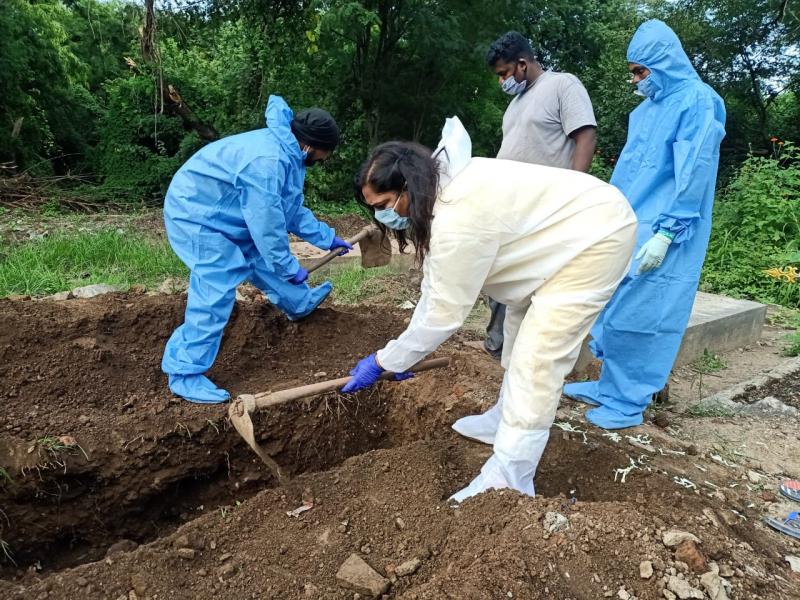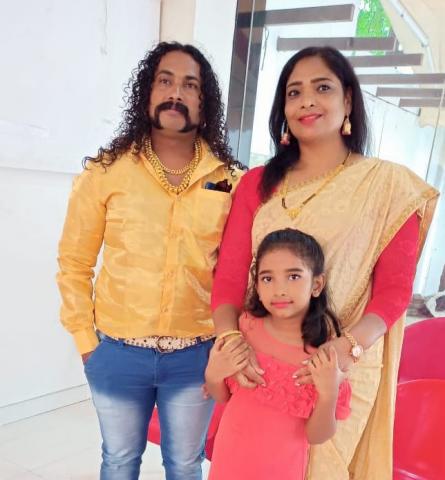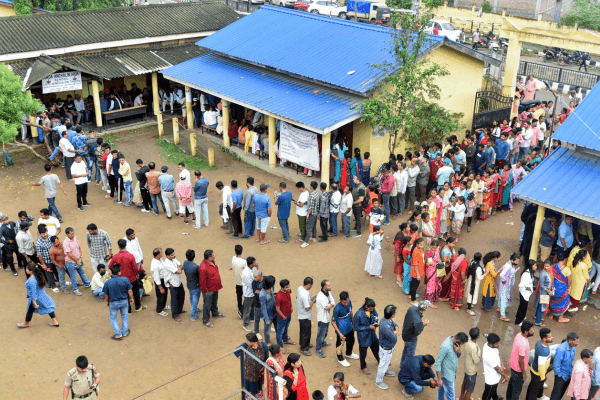PUNE, India — Death does not scare Sagai Nair.
She lowers the deceased into coffin boxes, carries them by foot to the graveyard with five other volunteers, uses a shovel to dig six feet inside the earth, and recites verses from the Bible for the grieving families.
After paying her last respects, she burns her protective gear, sanitizes herself, and prepares for the next burial.
In the coronavirus hotspot of Pune, 47-year-old Nair is one of the few women offering last rites for the dead — a traditionally male-dominated role. Nair is Christian, but she is also laying to rest Muslims and low-caste Hindus.
Hemant Naik, whose mother recently died from COVID-19, said Nair came forward when no from his own Hindu community did. He said the gesture made him see religion as a way of life rather than simply a set of rituals.
Since March, Nair has performed the last rites of more than 45 COVID-19 victims — some rejected by their families and others unclaimed as the virus tore through India. Pune has recorded one of the highest fatalities in the country, where over 86,752 people have died from COVID-19 and over 5 million have been infected, according to the World Health Organization, even as experts question the official government figures.
“I’d rather die fighting COVID-19 than resign to it,” says Nair, the founder of Christian Charitable Trust, an NGO in the Western Indian city of Pune. “We all have a role in this world, and let’s say this is my spiritual calling.”
The pandemic has also exacerbated religious and political polarization under the ruling Bharatiya Janata Party government led by Prime Minister Narendra Modi. Not only have thousands been stripped of their livelihoods, but the pre-existing structures of disadvantage based on social identity have been laid bare. Persecutions, labeling, and attacks against minorities have intensified, and hate has spilled freely into social media.
Pained by the disparate impacts of the pandemic, Nair says she feels it necessary to stand by distressed families who have been boycotted by their kin, friends, neighbors, and priests because of the stigma attached to the disease — as well as the deceased shunned by their own families.
photo_3.jpg

When the Modi government announced a nationwide lockdown in late March to curb the spread of the virus, Nair started visiting hospitals, people’s homes, and the streets to preach the gospel and offer emotional support. But when fatalities spiked, she reached out to the Mulnivasi Muslim Manch, another local NGO campaigning for the rights of minorities, to help carry out burials and highlight India’s pluralistic culture.
“In the absence of priests and faith leaders, the civic authorities were incinerating the dead in body bags,” Nair said. “Someone had to treat the victims with more love, care, and respect.”
Nair petitioned the civic authorities to allow her to perform the last rites free of cost. She said she would provide coffin boxes to those from the most disadvantaged communities and spiritual support to those in mourning. The fear of contracting the virus following the stringent lockdown prompted swathes of India’s population to isolate themselves. But Nair, unperturbed by the risk to her own life, went from neighborhood to neighborhood to spread awareness about COVID-19 and build solidarity among communities.
“After the lockdown was announced, houses of worship bolted their doors and priests pulled away,” Anjum Inamdar, the president of Mulnivasi Muslim Manch, said. “When no one was coming forward, Nair showed courage and empathy like no other, and even broke a patriarchal mold.”
A lifelong soul search
Nair said her hope for a more equal and spiritually conscious society incepted early. Born into a Catholic family with no financial or educational support, she was prompted in her 20s to explore the spiritual realm, meeting regularly with faith leaders.
“I was on a soul search,” she said. “I started visiting churches of different denominations across the city, and immersed myself in Christian spirituality and oceanic consciousness.”
Nair’s interest in karma and emancipation drew her to other religious texts, including those in Islam, Buddhism, and Hinduism. She says this study firmed her resolve to serve humanity as a faith leader without discriminations based on religion, caste, or gender.
In 2008, she joined the Christ Embassy Church of Pune, a broad neo-charismatic movement headquartered in Nigeria with over 13 million followers worldwide. A year later, she was appointed a pastor. Since then, Nair has been focusing on charity work in orphanages, slums, and nursing homes; providing shelter and food to the homeless; and serving as a spiritual guide in many of the city’s hospitals.
But she says it’s the pandemic that has molded her spiritual core, bringing her closer to her purpose.
Rev. Sachin Masih, pastor at St. Andrew’s Hindustani Church of Pune, likens Nair to Mother Teresa, “serving humanity in these trying times.”
Nair says she draws her inspiration both from Mother Teresa and from 19th century Indian social reformer Savitribai Phule. Phule not only worked tirelessly for women’s rights, but also played a critical role during the Bubonic Plague of 1896, when over 1,900 people died each week as the disease raged across India.
“They were pioneering women who laid their lives down by serving the destitute and plague-infected,” Nair said. “Like them, I want to inspire more women to be change-makers as we battle this pandemic.”
Practice what you preach
As many faith leaders have abdicated responsibility of funerals, last rites, and comforting the grieving, Nair fills an important role.
“Spiritual leaders should practice what they preach,” said Moti Lawrence, a preacher and representative of The Gideons International in India. “In such challenging times, they’ve chosen silence over service, while Nair is setting new standards through her selfless work.”
photo_9.jpg

Cyril Pinto, a manager at an insurance company in Pune who lost both his parents to COVID-19 in September, called Nair his “guardian angel,” sent to dispel the darkness.
“Our whole family was in shock and we didn’t know who to turn to,” Pinto, who is Catholic, said. “Nair arranged everything — from taking my parents to the burial ground to performing the last rites, and giving us a shoulder to cry on.”
After every burial, Nair makes sure to isolate herself to keep her husband and 7-year-old daughter safe. She unwinds through meditation, scripture readings, and prayers to boost her psychological health. Nair says her daughter feels anxious when she leaves, but recognizes the importance of her work.
“Seeing death from such close quarters is devastating, but my family is my biggest support,” she said. “As more hate sweeps the world, we’ll spread a contagion of love and humanness.”
Got something to say about what you're reading? We value your feedback!








